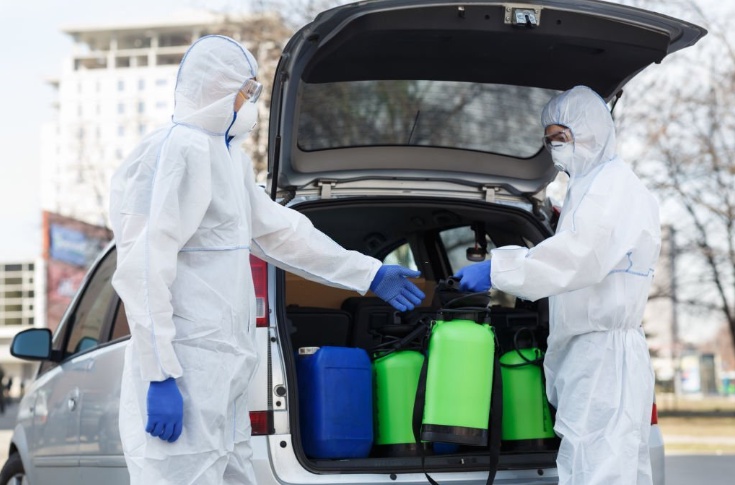Pest control has long been associated with the use of chemical pesticides, but there's another, more eco-friendly approach that's gaining momentum - biological pest control. This innovative method harnesses the power of nature to keep pests at bay, without resorting to harmful chemicals. In this blog, Pest Control St Kilda will delve into the world of biological pest control, exploring how it works, its advantages, and its role in maintaining a balanced ecosystem.
Understanding Biological Pest Control
Biological pest control involves using natural predators, parasites, and pathogens to control and reduce pest populations. Instead of introducing chemical substances into the environment, this approach relies on the delicate balance of nature to keep pest populations in check. By leveraging the natural enemies of pests, biological control seeks to create a sustainable and eco-friendly pest management solution.
How Biological Pest Control Works
The process of biological pest control begins with identifying the specific pest causing the problem. Once the pest is identified, the natural enemies that prey on or parasitize the pest are introduced into the affected area. These natural enemies can include beneficial insects like ladybugs, lacewings, and parasitic wasps, which feed on common pests such as aphids and caterpillars.
Predators and parasites don't just kill pests directly; they disrupt their life cycle and prevent them from reproducing successfully. This leads to a gradual reduction in pest populations over time, creating a natural and sustainable control mechanism.
Advantages of Biological Pest Control
1. Environmental Safety
One of the most significant advantages of biological pest control is its minimal impact on the environment. Chemical pesticides can have unintended consequences, harming beneficial insects, wildlife, and even contaminating water sources. In contrast, biological control agents are specific to their target pests, reducing the risk of collateral damage to non-target organisms.
2. Reduced Chemical Usage
By adopting biological pest control, the need for chemical pesticides diminishes significantly. This reduction in chemical usage benefits not only the environment but also human health. Farmers, gardeners, and homeowners can limit their exposure to harmful chemicals, making it a safer option for pest management.
3. Sustainable Solution
Biological pest control aligns with the principles of sustainability. It promotes a natural balance in the ecosystem, allowing pest populations to be regulated naturally without disrupting the delicate web of life. As a result, it offers a long-term solution that can be integrated into agricultural practices and pest management strategies.
4. Resistance Management
Pests have a remarkable ability to develop resistance to chemical pesticides over time. This poses a significant challenge for traditional pest control methods. Biological control, on the other hand, is less prone to resistance issues because it operates through multiple mechanisms, making it more difficult for pests to adapt and develop resistance.
Implementing Biological Pest Control
Introducing biological control agents requires careful planning and consideration. It's crucial to identify the target pest accurately and select the appropriate natural enemy to combat the problem effectively. Additionally, factors such as temperature, humidity, and environmental conditions must be taken into account to ensure the success of biological control strategies.
Common Biological Control Agents
Several common biological control agents are used to combat different pests:
1. Ladybugs (Coccinellidae)
Ladybugs are well-known predators of aphids, mites, and other soft-bodied insects. Releasing ladybugs into a garden can help keep aphid populations in check and protect plants from infestations.
2. Praying Mantises (Mantodea)
Praying mantises are fierce predators that feed on a variety of insects, including caterpillars, crickets, and grasshoppers. They are beneficial for controlling pest populations in gardens and agricultural fields.
3. Parasitic Wasps (Hymenoptera)
Parasitic wasps lay their eggs inside the bodies of pests, such as caterpillars and aphids. The wasp larvae then consume the host from within, effectively eliminating the pest.
4. Nematodes (Nematoda)
Nematodes are microscopic roundworms that parasitize and kill insect pests like grubs and weevils. They can be applied to the soil to target pests that reside underground.
Embracing the Future of Pest Control
As concerns about environmental sustainability grow, so does the interest in biological pest control. This eco-friendly approach offers a promising future for pest management, promoting harmony between humans and nature. By fostering the natural checks and balances of ecosystems, biological pest control enables us to coexist with the insect world while safeguarding our crops, gardens, and public health.
Conclusion
Biological pest control is a transformative method that exemplifies the power of nature in addressing pest problems. By leveraging the natural predators and parasites of pests, this eco-friendly approach provides a sustainable solution to manage pest populations without harming the environment. Embracing biological pest control can lead us to a future where we coexist harmoniously with the insect kingdom, ensuring a healthier and more balanced ecosystem for generations to come.
FAQs
Q1: Is biological pest control suitable for all types of pests?
A1: While biological control is effective for many pests, it may not be suitable for every situation. Its success depends on factors like pest species, environmental conditions, and the availability of natural enemies.
Q2: Can I use chemical pesticides alongside biological control methods?
A2: In some cases, integrating both approaches can be beneficial. However, it's essential to consult with pest control experts to ensure compatibility and avoid potential negative interactions.
Q3: How long does it take for biological control to show results?
A3: Biological control is not an instantaneous solution. It may take some time for natural enemies to establish themselves and control pest populations effectively.
Q4: Can I introduce natural enemies myself, or should I seek professional help?
A4: While some biological control agents are available for purchase, seeking advice from pest control professionals is advisable. They can assess the situation and recommend the most appropriate control agents for specific pests.


No comments yet